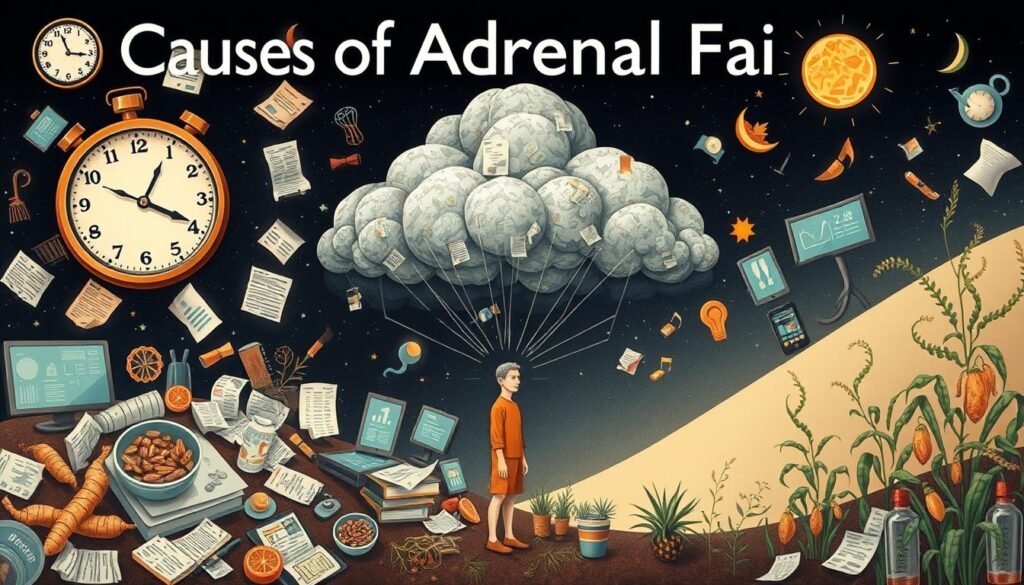Did you know around 75% of Americans feel chronic stress symptoms? This can lead to what’s called adrenal fatigue. Though seen by some as controversial, ‘adrenal fatigue’ refers to feeling tired, gaining weight, and having trouble focusing. But, the Endocrine Society says there’s no real proof it’s a medical issue. They point out it’s not the same as adrenal insufficiency, which is much more serious.
Spotting signs of adrenal fatigue isn’t easy. Its symptoms are vague and similar to many other conditions. The idea is too much stress might tire out the adrenal glands. These glands make important hormones like cortisol and adrenaline. Mainstream doctors don’t support specific treatments for adrenal fatigue. They suggest lifestyle changes such as reducing stress and eating well instead.
Key Takeaways
- Adrenal fatigue is not an officially recognized medical diagnosis.
- Symptoms include tiredness, cognitive difficulties, and low sex drive.
- Chronic stress is frequently linked to these symptoms.
- Essential hormones produced by adrenal glands include cortisol and adrenaline.
- Lifestyle changes can help manage symptoms associated with adrenal fatigue.
Understanding Adrenal Fatigue
Understanding adrenal fatigue means knowing how stress affects the adrenal glands over time. These glands are located above the kidneys. They produce hormones that help keep us healthy. When we’re stressed for too long, these glands can’t make enough hormones for our needs. This leads to symptoms known as adrenal fatigue.
Signs of adrenal fatigue include trouble sleeping, feeling tired all the time, wanting sugar and salt, and needing caffeine to get through the day. Being under a lot of stress for long periods makes some people more likely to have these symptoms.
Although the term adrenal fatigue is commonly used, many in the medical field don’t see it as a real medical issue. They say its symptoms are too general. That’s why it’s important to see a doctor for proper diagnosis. This usually involves blood or saliva tests to check hormone levels.
Dealing with adrenal fatigue means recognizing its symptoms and changing your lifestyle. Eating better, drinking less alcohol, exercising, and meditating can improve symptoms. While some suggest supplements, they should be used with care because of possible risks. Knowing about adrenal fatigue and how to manage it is crucial for good health.
What Causes Adrenal Fatigue?
Adrenal fatigue is thought to come from chronic stress. People face stress from work, personal life, or emotional issues. This constant stress can make the adrenal glands worn out, struggling to make enough hormones.
Chronic Stress and Its Impact
Chronic stress is key in causing adrenal fatigue. Long-term stress exhausts the body’s emergency resources, reducing hormones like cortisol. Symptoms like being very tired and wanting salty or sweet foods are common. If you have these symptoms, think about what in your life is stressful.
The Role of Adrenal Glands
The adrenal glands are important for stress response. They produce hormones to keep our body balanced. But with too much stress, these glands can’t keep up, leading to symptoms some call adrenal fatigue. Knowing how stress affects these glands is crucial for addressing symptoms well.

Common Signs of Adrenal Fatigue
Knowing the common signs of adrenal fatigue is key to identifying if you might have it. Symptoms show up physically and mentally, so it’s crucial to monitor changes in your body and feelings.
Physical Symptoms to Watch For
- Tiredness: A prevalent symptom, many individuals notice persistent fatigue that does not improve with rest.
- Body Aches: Unexplained pain in muscles and joints can be a common indicator.
- Cravings for Salt and Sugar: A strong desire for salty or sweet foods often accompanies adrenal fatigue.
- Weight Gain: Some may experience unexplained weight gain, further complicating their physical condition.
Mental and Emotional Indicators
- Trouble Falling Asleep: Difficulty initiating sleep is frequently reported.
- Trouble Waking Up: Individuals may find it hard to get out of bed, feeling exhausted despite hours of sleep.
- Emotional Instability: Mood swings or heightened levels of anxiety often surface as well.
Keeping track of these signs is useful for identifying adrenal fatigue. It helps when talking to healthcare experts about possible issues. Knowing both physical and mental signs gives a clearer view of how adrenal fatigue is different from other health problems.
Symptoms of Adrenal Fatigue
Figuring out if someone has adrenal fatigue is tough. Many symptoms are like those of other health issues. Yet, knowing the main signs helps spot this condition. Look for constant tiredness, specific cravings, and trouble sleeping.
Key Symptoms to Identify
Those who might have adrenal fatigue often face several problems, including:
- Persistent fatigue: Always feeling tired even if you rest well.
- Difficulties waking up: Finding it hard to leave the bed after sleeping all night.
- Sleep disturbances: Having issues falling or staying asleep.
- Low energy levels: Lacking the energy for everyday tasks.
Fatigue and Tiredness
Those with adrenal fatigue mainly complain about being tired. Their energy can swing wildly during the day. This might make them lean on things like coffee. Even easy tasks can seem hard, showing how deep tiredness goes.
Salt and Sugar Cravings
Adrenal fatigue can make people really want salt and sugar. This is because of hormone issues. Sadly, this might lead to choosing bad snacks, which doesn’t help with staying healthy. Eating right is key. For tips on eating better, check out established health resources.
Recognizing the Difference: Adrenal Fatigue vs. Adrenal Insufficiency
The difference between adrenal fatigue vs. adrenal insufficiency is key to understanding health issues. Adrenal fatigue is often linked to chronic stress and includes symptoms like tiredness, cravings, and energy loss. However, it is not officially recognized as a medical condition.
On the other hand, adrenal insufficiency is a real medical problem. It happens when the adrenal glands don’t make enough essential hormones. Signs of this include feeling very tired, having low blood pressure, losing weight, and developing darker skin.
Knowing the differences in adrenal conditions is critical for diagnosis and treatment. Since both conditions share common symptoms, a correct diagnosis is essential. If you’re feeling very tired all the time, it’s important to see a doctor. This will help avoid the risks of untreated adrenal insufficiency.
For those interested in learning more about adrenal health, comprehensive resources are available. These include insights into managing and understanding these conditions. For tips on improving adrenal health through lifestyle, click here.

| Condition | Definition | Symptoms | Treatment |
|---|---|---|---|
| Adrenal Fatigue | Non-medical diagnosis associated with chronic stress. | Exhaustion, cravings, low libido. | Lifestyle changes, dietary adjustments, stress management. |
| Adrenal Insufficiency | Medical condition with inadequate hormone production. | Chronic fatigue, weight loss, low blood pressure. | Steroid replacement therapy, medical supervision. |
Diagnosis of Adrenal Fatigue Symptoms
Diagnosing adrenal fatigue is not easy. The medical world does not fully recognize it. It includes various hard-to-define symptoms. People with these symptoms often struggle to be taken seriously by doctors. This makes diagnosing adrenal fatigue tough. Doctors must use many tests to check for other health issues first.
Challenges in Diagnosis
The unclear nature of adrenal fatigue adds to the confusion. Signs like tiredness, poor sleep, and cravings for sweets or salty food are hard to pinpoint. Medical experts worry that unclear terms like adrenal fatigue could lead to missed diagnoses. Conditions like adrenal insufficiency, diabetes, or depression have similar signs. It’s vital to get checked by a doctor to properly understand these symptoms.
Medical Tests Typically Employed
There are no tests made just for adrenal fatigue. But, tests for other conditions can help understand someone’s hormonal health. For adrenal insufficiency, doctors can check adrenal hormone levels. They might use:
| Test Type | Description |
|---|---|
| Hormone Level Tests | These tests measure cortisol and other hormone levels to check adrenal function. |
| CT Scans/MRIs | These imaging tests can show the adrenal glands and spot any oddities. |
| ACTH Stimulation Test | This checks how the adrenal glands react to adrenocorticotropic hormone. |
If you’re concerned about adrenal fatigue, talk to an informed doctor. Proper tests can find if there’s another issue causing your symptoms. This way, you won’t mistakenly blame adrenal fatigue.

Adrenal Fatigue Symptoms List: What to Look For
Seeing symptoms of adrenal fatigue is key for people who always feel tired or emotionally drained. A detailed symptom checklist makes it easier for people to spot signs that need a doctor’s attention. These symptoms often come from stress or bad lifestyle choices.
A Comprehensive List of Symptoms
Here is a detailed list of adrenal fatigue symptoms to be aware of:
- Waking up exhausted, even after sleeping all night
- Struggling with afternoon slumps during the day
- Cravings for salty or sugary foods, increased appetite
- Weakened immune system, making individuals more prone to colds
- Weight gain, especially around the belly
- Mood changes, like getting irritable and not handling stress well
- Persistent fatigue that rest doesn’t fix
- Difficulty concentrating or feeling foggy in the brain
Knowing this checklist for adrenal fatigue symptoms helps people pay attention to their health. This pushes them to see a doctor for a better diagnosis. Catching these signs early is very important for treating and managing them well.
Treatment Options for Adrenal Fatigue
Many are searching for ways to ease adrenal fatigue. They want to feel better without relying on untested supplements. To manage adrenal fatigue, it’s important to focus on lifestyle changes. These include regular workouts, eating well, and sleeping well.
Diet changes are key, but be careful with supplements. The treatment for adrenal fatigue depends on understanding the risky nature of unregulated supplements. Unregulated means they could harm you if you mix them with other medicines. Always seek personalized medical advice.
Finding out if other health issues are causing your symptoms is crucial. Issues like constant tiredness, craving sweets, and lack of drive could mean something else is wrong. It’s important to consult a doctor for these symptoms.
For actual adrenal insufficiency, doctors may suggest corticosteroids like hydrocortisone. These drugs make up for the cortisol your body is missing. In severe cases, immediate treatment with IV corticosteroids and saline is vital.
The journey to overcoming adrenal fatigue management involves careful planning and medical guidance. Along with positive lifestyle changes, they help people recover their energy and health.
Preventing Adrenal Fatigue Symptoms
It’s key to take steps early to keep feeling well and avoid adrenal fatigue symptoms. Making certain lifestyle changes can boost your energy and clear your mind.
Lifestyle Changes for Better Health
Adopting healthy habits can fight off fatigue. Here are a few tips to follow:
- Stress management techniques: Use meditation, yoga, and deep-breathing exercises to lower stress and feel more relaxed.
- Regular physical activity: Exercise regularly to lift your mood and increase energy.
- Consistent sleep schedule: Sleep well and regularly to help your body recover and keep hormones balanced.
- Avoiding stimulants: Cut down caffeine and sugar to keep your energy stable, avoiding highs and lows.
Diet and Nutrition Recommendations
What you eat is vital in avoiding adrenal fatigue. Eating nutritious foods helps keep your adrenal glands healthy. Here’s what to eat:
- Balanced meals: Eat whole grains, lean proteins, healthy fats, and lots of fruits and veggies for steady sugar levels.
- Hydration: Drink plenty of water to aid your body’s functions and keep your energy up.
- Monitor salt intake: A bit more salt might be okay if you’re craving it, but stay mindful of your health needs.
- Limit processed foods: Eating less sugary and fatty processed foods helps avoid energy drops.
Making these lifestyle changes for adrenal health lays the groundwork to dodge adrenal fatigue. If symptoms persist, seeing a healthcare provider for personalized advice is a smart move toward better health.
| Practice | Benefits |
|---|---|
| Stress management techniques | Lowers stress hormones, boosts emotional strength |
| Regular physical activity | Raises endorphins, improves mood, and increases energy |
| Consistent sleep schedule | Refreshes energy, helps balance hormones for better health |
| Balanced meals | Keeps energy steady, supports hormone health |
Conclusion
Understanding adrenal fatigue symptoms is key during stressful times. This condition, marked by tiredness, anxiety, and poor sleep, lacks official recognition. Yet, it matters greatly. If you’re always tired or have sudden dips in energy, think about your health. Maybe it’s time to talk to a professional.
Knowing our bodies and taking good care of ourselves is important. Stress can cause many symptoms linked to adrenal fatigue. To learn more about managing fatigue, check out this article on diagnosis.
Being informed helps us stay healthy. Watching our symptoms closely is crucial. Seeing doctors regularly and making small changes in our lifestyle helps fight stress. The path to feeling better might be tough, but it’s possible with the right steps.